At a time when other real estate brokerages are struggling, United Real Estate is thriving. The brokerage has also grown its market share and agent size exponentially over the past decade.
The Dallas-headquartered company has soared in agent growth and is now the eighth largest in the U.S., jumping from 139th in RISMedia’s 2020 Power Broker Report to the largest flat-fee brokerage in transaction count today. United has done what few brokerages have been able to achieve: meteoric success without sacrificing its core principles.
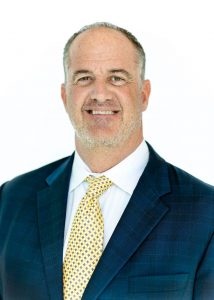
And it’s all by intentional design, says Dan Duffy, CEO of United Real Estate. A former leader and investor in the tech space, Duffy is no stranger to taking risks and betting big. His approach paid off with the product-led tech startups he’s built and advised.
But when it came to finding a new venture to invest in and build, Duffy was instantly drawn to United Country Real Estate, a 100-year-old company. The thrill of taking a great company culture and transforming it into something even better in a completely different sector of the real estate industry was exactly the challenge Duffy wanted.
And, as most real estate professionals know, no two days are alike in this business.
“We intentionally built something that wasn’t an incremental improvement on the status quo,” says Duffy. “We wanted to create something that had resilience and the absolute, most efficient delivery of services and products so that our agents and brokers could win.”
Duffy and his executive team took a “clean sheet of paper” approach when founding United, shunning the legacy systems and sacred cows, such as high commission splits, of traditional brokerages. The result is a winning model that prioritizes agent profitability and happiness above all else.
“When we looked at the business model, there were some really amazing pioneers that had solved some of the fundamental problems in the real estate industry,” explains Duffy. “We started looking at it in 2011 and said, ‘Well, if we were going to build a business from scratch, what would we build to solve the problems at the brokerage/national/brand levels, and, ultimately, with an eye on solving some of the fundamental problems for brokers and agents?’”
The easy answer was a 100%-commission model that empowers United’s 21,000 agents to keep most of their earnings. In exchange, United charges a flat monthly fee to provide agents with marketing, training and development, full-service support and technology resources instead of the traditional broker/agent revenue split.
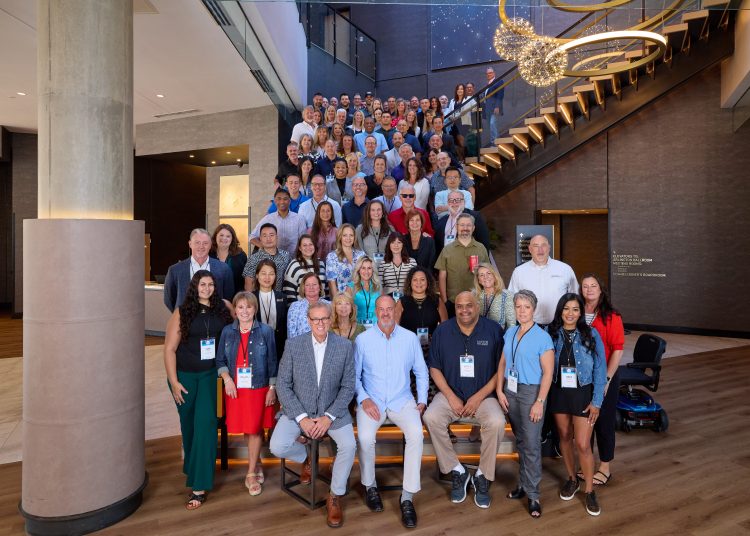
So, in 2011, United Real Estate was born out of the storied 100-year-old United Country brand, armed with a new mission to “improve the financial trajectories of brokerages and agents by delivering uncharacteristically high levels of support and services.”
This unconventional brokerage model has been a major draw for top-producing agents and brokers. And it’s fueling United’s rapid growth at a time when other real estate companies are contracting or eyeing the exits.
“Lead with culture, follow with purpose”
Talk to any United leader, broker or agent, and they’ll likely point to the brokerage’s people-first culture as a key differentiator. They may have initially come for the promise of keeping more of what they earn, but they ultimately stay because of how they’re treated.
It certainly tipped the scales for Duffy when he looked to invest in a new business after his successful tech career. His previous work in that space taught him that a company’s core values, guiding principles and culture are the most difficult things to change.
But as soon as he met with leaders and brokers at United and got to know the inner workings of the company, Duffy knew he had found something special. And while he didn’t know much about real estate back then, he was eager to listen and learn.
“There was this consistent theme within the brokerage and the company that it was more than how much volume we do and how much money we make,” Duffy recalls. “There are people who are part of United that are fifth-generation partners. You don’t see that in business these days.
“Here, we see things differently—that you lead with culture and follow with purpose,” he says.
United’s culture of caring is best embodied by the people who drive the brokerage’s remarkable success story.

“We have a very rare, carefully curated assemblage of talent that goes to work every day within their discipline, and the mosaic that it brings together in terms of the organization is incredible,” says Rick Haase, president of United Real Estate.
The strategic genius of that talent has enabled United to make major investments in technology and agent support systems that have helped propel the brokerage to incredible growth. “We did it by building a platform that could scale efficiently, without adding costs to agents and brokers,” notes Haase.
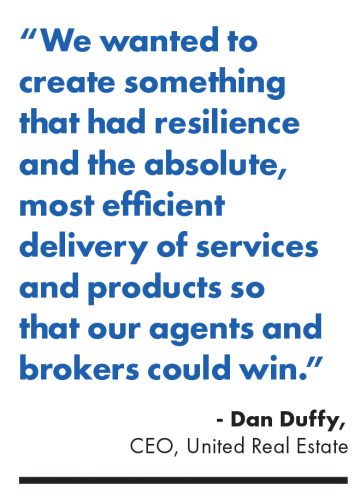 “Because of our proprietary tech stack, we’re able to add agents, control costs and make sure they get the tools, services and support without damaging our ability to continuously flow that gross commission income into brokers’ and agents’ bank accounts,” Haase says. “By doing this, we are able to stay on our mission of improving the financial trajectory of our brokers’ and agents’ careers, vision and lives.”
“Because of our proprietary tech stack, we’re able to add agents, control costs and make sure they get the tools, services and support without damaging our ability to continuously flow that gross commission income into brokers’ and agents’ bank accounts,” Haase says. “By doing this, we are able to stay on our mission of improving the financial trajectory of our brokers’ and agents’ careers, vision and lives.”
The company’s agent-first approach has paid dividends, with United weathering the recent market downturn far better than many of its competitors. While many other brokerages have been shedding agents and losing money, United has continued to grow its agent count and remain profitable.
“We’re not only weathering the storm, but we’re doing incredibly well,” Duffy says, referring to the aftermath of the National Association of REALTORS®’ (NAR) commission lawsuit settlement. “We should send the lawyers a thank-you. It made our business stronger.”
Defying the odds and a down market through growth
In some markets where United operates, existing-home sales have plummeted by as much as 40%, Haase reports. Despite the headwinds of slower home sales, high home prices and elevated mortgage rates, companies joining United have a 27% growth rate, post-transaction, after joining the network over the last five years, he points out.
“People who opted into our company 10 years ago are renewing and extending their agreements for another 10 years,” Haase says. “If you go back 13 years when we were a fledgling upstart company, and we went from one agent to 21,000 agents in 13 short years—that’s an incredible growth rate.”
But United is careful about becoming too focused on production numbers. When companies do that, they tend to make business decisions that aren’t conducive to supporting their people, Haase points out.
“If you focus on being good, bringing the right services, tools and support to agents, and being there to help them when they have needs, you’re going to be rewarded—and we have been—with more people wanting to be part of your organization,” he says.
In addition to twice-monthly broker leadership calls where leaders share ideas and help each other navigate tricky situations, the company’s success is tracked through regular agent surveys. For instance, United’s Net Promoter Scores are “off the charts,” a testament to the strong relationships the company has painstakingly built with its agents, Haase notes.
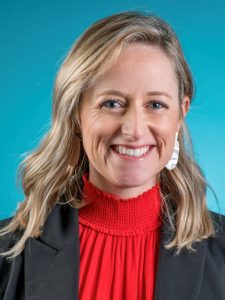
Much of United’s impressive growth and success can be directly tied to the brokers who lead the 159 local offices, says Leigh Ann Bogran, vice president of operations with United.
“Our local brokerage teams focus on growth, but also provide tremendous transaction support, problem solve, create office environments for success and provide mentorship and training,” says Bogran. She adds that many United brokers also attended and held countless training sessions after the NAR settlement to ensure their agents understood and complied with the new rules.
“It starts at the top,” Bogran points out. “Our national team operates in a very lean way, and we always keep our agents’ and brokers’ success as our North Star; it’s what we work for every day.”
But Bogran makes it clear that the company’s local brokers are the essential glue that holds United together. And having knowledgeable, experienced brokers who know what it takes to excel in up or down markets, “gives those agents the confidence and the conviction to go out and win more business,” she says.
“Our brokers in the local offices who motivate and inspire our agents every day to reach their potential is why we’ve been able to outpace the market—and outpace our competitors.”
Savvy tech investments pay dividends
Right-sizing a real estate brokerage’s technology offerings while building buzz for a bespoke brand are complex undertakings. The race to capture and convert leads is ruthlessly competitive, and it requires constant investment, tracking, training and support.
No one knows this better than United’s Chief Technology Officer David Dickey, who oversees the company’s annual $5 million technology spend and product implementations.
The crowning jewel of its tech offerings is its proprietary cloud-based Bullseye Agent & Broker Productivity Platform, which gets 30,000 agent logins each month.
“We really focused on the agents, their branding, their websites,” says Dickey of building the Bullseye platform. The one-stop-shop platform for agents offers CRM, marketing, lead generation, SEO-optimized websites and more—all at no additional cost.
United agents can also access Dave Ramsey’s SmartDollar program through their Bullseye account. The workplace financial wellness program is available to agents 24/7 and includes access to a budgeting app to help them track their spending and savings, and build healthier financial habits.
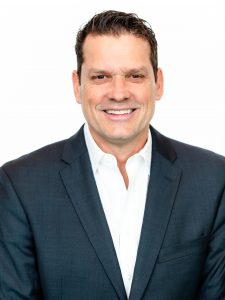
Unlike many of its competitors, which charge agents extra for various technology tiers or rely on third-party vendors, United has built a well-oiled tech stack of its own so that the company isn’t at the mercy of a vendor dictating what they can (or can’t) include in their tech offerings, Dickey notes.
United has invested tens of millions over 15 years to build and scale its cutting-edge technology, with a dedicated 30-person software development and tech support team.
Looking ahead, Dickey says he’s excited about enhancing United’s AI-powered MLS listing warehouse and launching an even more robust “Bullseye Marketplace” for agent tools and services, with functionality similar to Apple’s Marketplace, he adds.
“It’s been a wild ride, but it’s been great,” says Dickey. “And we’re ready to continue growing.”
Helping agents capture more business
One significant investment that will be central to United’s future growth is LeadBoost, the company’s signature lead-generation program, says Amanda Cline, United’s vice president of marketing. LeadBoost offers agents “the lowest possible cost to obtain leads from the market.”
LeadBoost gives agents access to brand-building and lead generating programs by using pre-made, expertly designed, customized campaigns to reach buyers and sellers on social media and other digital outlets without the need for their own listing inventory.
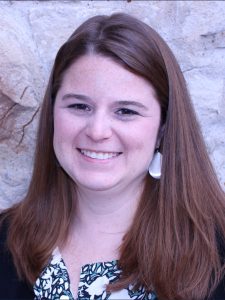
The set-it-and-forget-it program is already boosting business for Ashburn, Virginia-based Pearson Smith Realty, according to CEO Eric Pearson. Pearson is also the executive vice president of the United Leads Program, which encompasses LeadBoost, Zillow Flex, Realtor.com® and other lead-gen programs.
“Our goal is to help agents add another six to 12 transactions a year–blending both the 100% commission model with increased agent productivity,” explains Pearson. “We can help them with lead generation so they can focus on building their business, which often takes time as you come into a brokerage. In the meantime, we give them a pillar that lets them ramp up a lot quicker.”
The cornerstone of the United Leads Program is the training and management support the company provides to make sure agents actually work the leads they receive, rather than letting them go cold, Pearson explains. While lead generation can often have a long ramp-up period and be expensive, he says LeadBoost has solved those challenges.

In fact, Pearson is so bullish on the program that he hopes to see every agent using it.
“I’d love to build more quality lead programs at every United office,” Pearson says. “It’s a major driver of agent productivity and growth, especially for agents starting out in the industry.”
Aside from LeadBoost, there’s a Marketing Hub that allows agents to quickly create and distribute customized marketing content. Then there’s the popular Learning Academy, an on-demand learning platform chockfull of educational video content.
“With a click of a button, you can learn everything you need to know about LeadBoost, Marketing Hub or any of our programs in 10 to 20 minutes of watching these videos at your own pace and at your own time,” says Cline.
She adds that United Real Estate’s focus on training and equipping its network has allowed the company to maintain its strong momentum even as the market cools.
This year, Cline says the company plans to roll out a new logo and fine-tune its marketing tools and programs to better support existing agents and attract new brokerages to join the United brand.
“We know once agents see our toolkit and our model, it becomes really hard for them to say, ‘no, this isn’t an opportunity for me,’” says Cline.
Providing reassurance amid the uncertainty
Few things have rocked the real estate industry like the NAR settlement did in 2023 and 2024. But despite the changes in NAR policies, including offers of agent compensation being prohibited from MLS listings and mandatory buyer agreements, several United brokers say they’ve been impressed with how United has responded.

“I have slept well at night knowing that Dan Duffy and the leadership team were there to assist us and were at the helm,” says Eric Gallus, owner of Premiere Plus Realty based in Naples, Florida. His brokerage joined United in March 2024 after 20 years of operating as an independent brokerage, bringing 1,500 agents to United.
Gallus notes that the leadership team continuously provided an abundance of support during one of the most challenging times in real estate, which helped in rolling out training and resources to agents, particularly in Florida, where buyer agreements weren’t previously required as they were in some states.
Ray Rivera has been equally impressed with United’s helpful, positive approach. Rivera is CEO of Jacksonville, Florida-based United Real Estate Gallery. After exploring a few brokerage options, Rivera said he went with United about two years ago after his office became the largest EXIT franchise in the country.
However, Rivera felt the EXIT model had become unsustainable, with high agent turnover and shrinking profit margins. Rivera was sold instantly on United leadership’s openness to his input and their focus on agent financial wellness and culture.
The move has paid off, with United Gallery seeing double-digit growth in agent count even as area home sales dipped.
“The positivity at the home office has been phenomenal,” Rivera says. “We’re actually increasing agent count and doing as many or more deals than we did last year.”

For Rivera, the fact that United focuses on improving agents’ financial futures rather than their production was unique. Duffy’s background in technology, Rivera says, gives him a different take on what it takes to run a successful business.
“For us, it’s refreshing because it’s not all doom and gloom,” he explains, adding that the communication from the home office has been reassuring amid all the industry and media noise.
“We’ve partnered with the right company and are working with the right model,” he explains. “Our agents retain the majority of their earnings, which means even with fewer deals, they keep more of what they make. If the market holds steady this year, I’m confident we’ll continue to see strong growth.”
Meanwhile, Haase and the leadership team are doing what they do best: asking the right questions, listening to their boots on the ground and coming up with cost-effective solutions. Haase is optimistic about United’s future, and that’s mirrored in the optimism he’s hearing from brokerage leaders who have a renewed sense of joy and fulfillment at work again.
“Some of them come to us saying, ‘I’m going to be out in six months or a year. Can you take my company?’” Haase says. “And literally every one of them (except one) has come back and said, ‘This is fun again. I’m here for the duration,’ and we couldn’t be happier to have these leaders in the company and put their considerable talents to use across the nation.”
